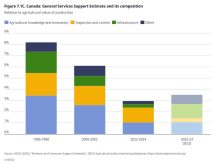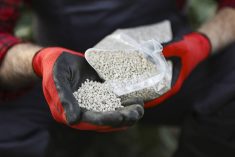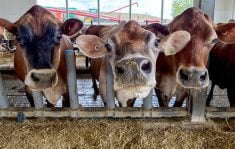EMISSIONS System transformation, not tweaking, is needed to mitigate climate change, says new report
Pushing for higher yields and greater exports each year will lead to greater nitrogen greenhouse gas emissions, even if greater efficiency is achieved, says a new report from the National Farmers Union (NFU).
“If we do not scale back… if we pretend instead that tweaking our nitrogen-use practices can solve the problem, we may make short-term progress… but the relentlessly upward trends in grain and meat output and associated fertilizer use will soon reverse any such progress,” says the report, released Aug. 31.
“Farmers need to step off the yield-and-output treadmill — the input-use treadmill,” the report adds.
Read Also

Manitoba John Deere dealers plan merger
Two retail dealership chains handling John Deere farm equipment in Manitoba say they plan to merge, bringing 13 locations under one organizational umbrella.
[READ MORE] Emissions goal realistic — even conservative — with enough funding, experts say
The discussion paper is the NFU’s submission to consultations on the federal government’s goal of a 30 per cent reduction in emissions from nitrogen fertilizers by 2030.
The lengthy document outlines the rise of nitrogen fertilizer as a force behind modern crop agriculture (the Green Revolution) and a massive expansion in livestock agriculture driven by research, innovation, agri-business and a “sustained push by governments around the world.”
“We must stress that in using that fertilizer, farmers are not doing anything ‘wrong’,” the report says. “Nitrogen fertilizer is an important contributor to human thriving and to many of the benefits we enjoy today.
“North American farmers are embedded in a multi-trillion-dollar global system that pushes for ever-higher yields, production, exports, agribusiness profits, etc.,” it adds. “In many cases, for an individual farmer to unilaterally renounce fertilizers and step outside the economic logic of that system could be difficult or risky. The rules of the game must be changed,” it says.
[READ MORE] Editor’s Take: Simmer down
In the interim, the NFU calls for implementation of 4R nutrient application practices (right time, right placement, right rate, right source); enhanced environmental farm plans that can include emission reduction and nutrient management plans; cover crops where feasible; and precision agriculture and variable-rate application.
Farmers must have the support of independent extension agrologists — public servants who are not salespeople, the NFU says. It proposes a Canadian Farm Resilience Agency to provide this service.
In the long-term, however, greater efficiency isn’t enough, the report says.
“Even if we use nitrogen more efficiently, if we simultaneously use much more nitrogen, then system losses and ecosystem impacts will increase, not decrease.”
Instead, “we need a wholly different kind of agricultural system,” the NFU says.
The report suggests models like low-input, organic, regenerative, agro-ecological and minimum-input no-till can offer solutions.
Farmers should get more from biology and less from industry, it adds.
“We need to reconnect with biological processes and the circular flows of nature,” the report says, adding that the way to do this isn’t clear but it’s an aspirational direction.
Governments should stop pushing for maximum exports and instead work to get farmers maximum margin and net income, and increase the number of farmers. Furthermore, governments should help shoulder the risk and costs as farmers invest in new systems.

















